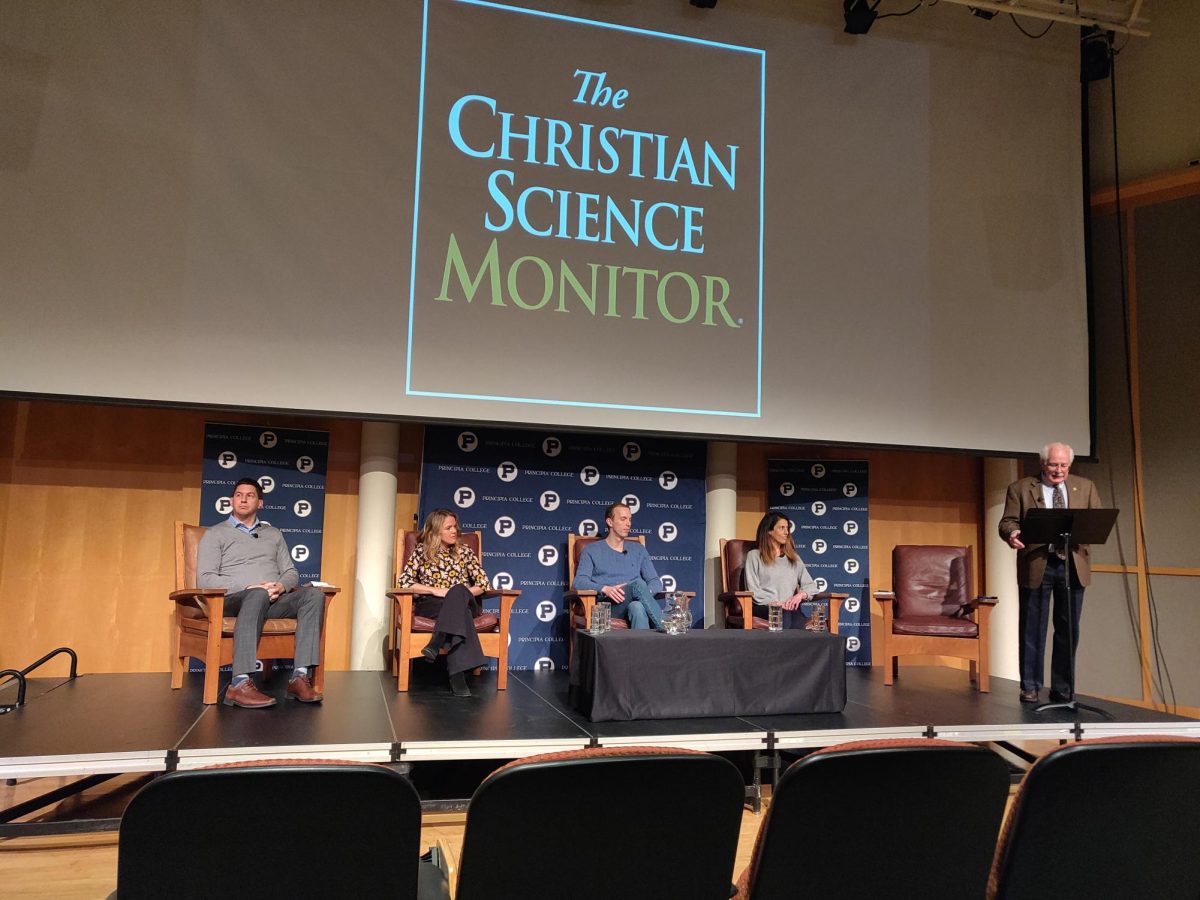By Ure Okike
With the pandemic erasing the possibility of a typical in-person panel, Monitor Night Live 2021 went virtual. The event, hosted by college president John Williams on Zoom last Thursday evening, was themed “21 in ‘21” and focused on the global report of the same title published by the Christian Science Monitor earlier this year. This year’s panel included four Monitor staffers who collaborated on the report: South Africa correspondent Ryan Brown, Beijing bureau chief Anne Scott Tyson, senior Middle East correspondent Scott Peterson, and editor-in-chief Mark Sappenfield.
Monitor Night Live officially kicked off with a video (composed mostly of archival footage) that traced the history of the event to its inaugural year of 1996 and reflected on the vision of its institutor, George Moffett, who was Principia College’s president at the time. The video also highlighted the long-standing relationship between the Christian Science Monitor and Principia thanks to events like Monitor Night Live. A second video was shown afterwards to introduce audiences to the night’s theme.
The Monitor’s global report “21 in ‘21: Coming of age in a pandemic” sought to explore the changes that had come into the lives of those coming of age all over the world during an extremely turbulent time in history. In reporting on the lives of twelve 21-year-olds from around the world, the Monitor explored a style of journalism that Sappenfield said “had never been done” by the publication before. He noted that the report presented the story “as-told-by,” removing the analysis that usually comes from the journalists.
The panelists shared various aspects of the global report, from the lives of the 21-year-olds during the pandemic to the logistics of reporting remotely to the broad effects of the pandemic on the lives of the young adults.
Brown, who called in from South Africa, spoke about what inspired the project. “I wanted to know what it was like for the world to stop just as your life is about to begin,” she said, noting that big life changes often occur at the age of 21. She added that generations are often defined by the major world events that shape the lives of young adults. “The Monitor wanted to explore the effects of the pandemic in real-time.”
Brown shared how the pandemic had affected the life of Sindi Dlambewu, a 21-year-old from South Africa who was pregnant during the last nine months of 2020. “21 is the average age a woman in South Africa has her first child,” Brown said, adding that it was her intent in reporting on Dlambewu to show what life was like for the average South African woman. Dlambewu had her baby in January.
Peterson did most of his reporting from London, and talked about the difficulties in reaching his subject, Zabihullah Noori, from so far away. The 21-year-old boxer from Kabul, Afghanistan had tried to escape the hardship of his homeland and “a terrible domestic situation” by migrating to Europe. Noori was met with danger at the Iran-Turkey border and was eventually deported home during the pandemic.
From Seattle, Washington, Tyson reported on Lucy Wang, an international student and finance major at Northeastern University. At the start of the pandemic, caught in the tension between China and the U.S., Wang had to grapple with the fact that if she left for her home country, she might not come back. Wang ultimately did leave Boston to continue her studies virtually from Beijing with her cat, Cotton. “The cat was really a personality to her,” Tyson said as she shared more about Wang’s struggle to bring her cat back with her to Beijing. The story reflected strong bonds forged in isolation during the pandemic.
When asked by student journalist and junior Sophie Hills about government interference and censorship in international reporting, Tyson discussed the difficulty of covering China: “American journalists in China face a lot of difficulties, given the levels of surveillance they are under.” Peterson spoke on the difficulties of getting visas into Middle Eastern countries. He explained that, often, the situation is complicated by bureaucratic and intergovernmental blockages on observers like journalists in nations like Yemen. “One way that governments interfere is by preventing you from getting there,” he said.
The “21 in ‘21” deep-dive unearthed new insights about how the COVID-19 pandemic was handled around the world. Tyson said that it revealed how effective China had been in containing the virus,” an impression she got from Wang’s ability to go out with her friends in-person as the year progressed. Tyson pointed out China’s use of “draconian” lockdown measures at the sign of any outbreaks.
Sappenfield called the report extensive and intimate. “You get the sense that you are sitting in the living room with these 12 people,” he said. “It…delivered people’s voices unfiltered.”
A large virtual audience enjoyed the night’s event, with over a thousand people in attendance, including groups viewing it together.
“It was superb journalism,” said Brian Roberts, Principia faculty member in the Political Science department. “I was heartened to see the video in tribute to the former college president, George Moffett.”
Junior Dana Cadey recognized that this year was different from the past Monitor Night Live events she had attended in the past due to it being virtual, but was still impressed by the quality of the broadcast. “I really appreciated how the panelists were able to share their experiences with all the people they interviewed,” Cadey said. She shared that it was great getting to hear about the logistics of how each story was put together.
Despite the change, 2021’s Monitor Night Live was engaging and informative, as always.







